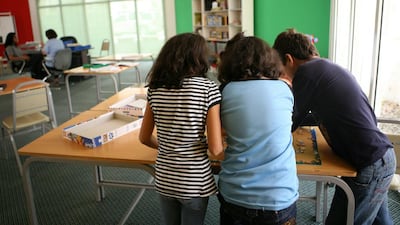DUBAI // A shelter for women and children who have been have victims of abuse has already dealt with 187 cases so far this year.
Most of the victims were women, half were Emirati and the majority applied in person for help.
The Dubai Foundation for Women and Children (DFWAC), the only shelter in Dubai for these types of cases, dealt with 414 cases last year.
Of the 187 so far in 2014, 173 were external, where the victims were not sheltered at the centre, but received services outside.
Fifty-three per cent of these cases were victims of domestic violence, while 39 per cent were humanitarian cases.
There were 12 victims of child abuse and one of sexual abuse.
Internal cases are emergency ones – where victims receive in-house shelter and support services.
For example, food and clothes would be provided inside the centre in an internal case, while an external case would receive family consultation or therapy.
“The majority of all the new cases were females, with only 46 males having received care services in DFWAC in the same period. And 156 cases were above 18 years old, while 31 cases were under 18,” said Arfa Al Basti, director general of the shelter.
Furthermore, internal clients, of which there were 14, comprised mostly of child and domestic-abuse cases – 57 per cent and 22 per cent respectively.
Last year there were 101 internal cases and 313 external.
“The increasing number of cases reflects how DFWAC succeeded in raising awareness about these causes among society to prevent it from happening in the future. But it also requires increasing our efforts to keep up with these increasing numbers,” said Ms Al Basti.
Furthermore, 89 of the cases involved Emiratis. Last year about 119 cases involved nationals. There were 98 cases from other nationalities.
DFWAC receives cases through several channels, including its own hotline, embassies, the police department, other shelters and referrals from friends or family.
According to the centre, Dubai police directed 64 per cent of the internal – or sheltered – cases to DFWAC, while 22 per cent applied in person.
Of the external cases, 82 per cent applied in person, while 6 per cent were directed by relatives and three per cent by friends.
“A comprehensive evaluation is conducted on the case, and then it is accepted as an external case – the case that benefits from the foundation’s services without the need for immediate shelter – or an internal case that requires immediate shelter,” said Ms Al Basti.
Also, she added that a case manager would then be assigned to each case to take the history of abuse suffered by the client, as well as create a support plan.
Afterwards, victims are helped to reintegrate into the community. Each case is followed up for at least six months.
Ms Al Basti said the services DFWAC offered included its emergency hotline – 800 111 – an emergency shelter, supporting services, as well as a rehabilitation plan.
“The services for external cases vary from offering family consultation, psychotherapy services and legal consultations, besides providing other humanitarian services that aim to promote the feeling of safety to the victims,” she added.
As for internal cases, its services included housing, medical care and education.
The centre, which works on short-term treatments for clients, reported that 112 cases had finished their rehabilitation during the first quarter. The cases included five that were sheltered in DFWAC.
However, 75 cases from last year were still receiving care services.
“We couldn’t have accomplished any of this without the permanent and big support from the Government and the private sectors,” said Ms Al Basti.
nbakhsh@thenational.ae

